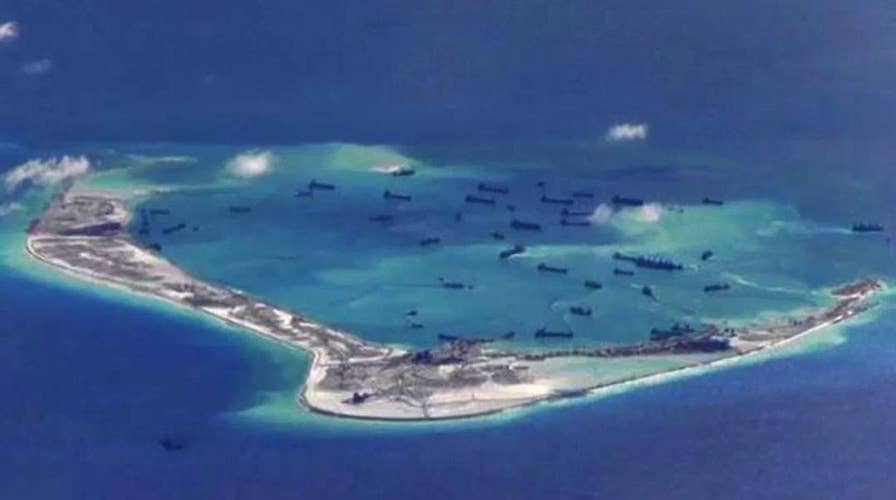US Navy: China is clearly militarizing the South China Sea
Gordon Chang, Asia analyst and author of 'The Coming Collapse of China,' says Beijing's actions will destabilize the region
EXCLUSIVE: In a move likely to further increase already volatile tensions in the region, China has deployed fighter jets to a contested island in the South China Sea, the same island where China deployed surface-to-air missiles last week, two U.S. officials tell Fox News.
The dramatic escalation came as Secretary of State John Kerry hosted his Chinese counterpart, Foreign Minister Wang Yi, at the State Department.
Wang said Tuesday he hoped that “close up” military flights and patrols by U.S. Navy ships over the contested islands would end.
Kerry said he wanted China to end its militarization of the contested islands in the South China Sea.
"We want to halt the expansion and the militarization of occupied features," he said.
His Chinese counterpart added that he didn't want to see any more U.S. military over flights or patrols.
"We don’t hope to see any more close-up military reconnaissance or the dispatch of missile destroyers or strategic bombers to the South China Sea," said Foreign Minister Wang.
Kerry however refused to blame China directly for the the military buildup in the South China Sea.
"It is important for all of the nations – China, Philippines, Vietnam, others – not to engage in any unilateral steps of reclamation, of building, of militarization. And the fact is that there have been steps by China, by Vietnam, by others that have unfortunately created an escalatory cycle," he said Tuesday.
Chinese Shenyang J-11s (“Flanker”) and Xian JH-7s (“Flounder”) have been seen by U.S. intelligence on Woody Island in the past few days, the same island where Fox News reported exclusively last week that China had sent two batteries of HQ-9 surface-to-air missiles while President Obama was hosting 10 Southeast Asian leaders in Palm Springs.
One U.S. official put the number of Chinese warplanes in the single digits, “under ten,” he said.
Wang was supposed to visit the Pentagon Tuesday, but the visit was canceled. It was not immediately clear which side canceled the visit. Pentagon press secretary Peter Cook said a “scheduling conflict” prevented the meeting, when asked by Fox News at Tuesday's press briefing.
When asked about the earlier Fox News story in Beijing, Wang said the deployment of the missiles was for “defensive purposes.”
Woody Island is the largest island in the Paracel chain of islands in the South China Sea, and has had a runway since the early 1990s. It lies 250 miles southeast of a major Chinese submarine base on Hainan Island. China has claimed Woody Island since the 1950s, but it is contested by Taiwan and Vietnam.
In the last two years, China has created 3,000 acres of artificial islands atop reefs hundreds of miles south of Woody Island in the Spratly chain of islands. One runway was tested in January, when two commercial airliners landed at Fiery Cross Reef.
After the deployment of fighter jets to Woody Island, officials are concerned the Chinese might send them south to the Spratly islands next.
Ahead of Wang’s visit to Washington, a spokeswoman likened China’s military buildup on Woody Island to the U.S. Navy’s in Hawaii.
“There is no difference between China’s deployment of necessary national defense facilities on its own territory and the defense installation by the U.S. in Hawaii,” Foreign Ministry spokeswoman Hua Chunying said Monday.
More than $5 trillion of worth of natural resources and goods transit the South China Sea each year.
Earlier Tuesday, the head of the U.S. military’s Pacific Command said China is “clearly militarizing” the South China Sea, in testimony before the Senate Armed Services Committee.
"You’d have to believe in a flat Earth to believe otherwise," Admiral Harry Harris said.
China has sent fighter jets to Woody Island before. In November, Chinese state media published images showing J-11 fighter jets on the island, but this was the first deployment of fighter jets since the Chinese sent commercial airliners to test the runway at one of its artificial islands in the South China Sea.
The Pentagon sailed a guided-missile destroyer past a contested island in the South China Sea as a result. Late last year, the U.S. military conducted a flight of B-52 bombers and another warship to conduct a “freedom of navigation” exercise.
The commander of the U.S. Navy's 7th Fleet said Monday that he is wary of the situation in the South China Sea being painted as a battle between the United States and China, but added the presence of a Chinese missile system on a disputed island will not stop the U.S. military from flying over the region.
"I wish it wasn't portrayed as U.S. versus China," U.S. Navy Vice Adm. Joseph Aucoin told reporters in Sydney. "This shouldn't seem provocative. What we're trying to ensure is that all countries, no matter size or strength, can pursue their interests based on the law of the sea and not have that endangered by some of these actions."
The Chinese foreign minister asked the media on Tuesday not to forget the strategic bombers the U.S. has flown in the past, but also expressed a shared desire to resolve disputes through peaceful dialogue.
"We take the foreign minister at his word today that he wants to see this resolved through dialogue," said Kerry.
When asked to asses U.S.-China relations, Foreign Minister Wang said China's relationship with the U.S. was hard to explain.
"Oftentimes one cannot simply give a definition to it," he said.
The Chinese have protested the previous moves and vowed “consequences.”
On Monday, new civilian satellite imagery from CSIS showed a possible high frequency radar installation being constructed in late January.
The imagery shows radar installations on China’s artificial islands in the Spratley Island chain of reefs-Gaven, Hughes, Johnson South, and primarily on Cuarteron reefs—the outhermost island in the South China Sea.

